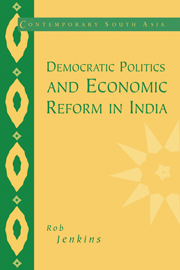Book contents
- Frontmatter
- Contents
- For M.S.J.
- Acknowledgements
- Map: States of the Indian federal union
- 1 Introduction
- 2 The evolution of economic reform in India
- 3 Theoretical and comparative perspectives on the politics of economic reform
- 4 Political incentives: elite perceptions and the calculus of survival
- 5 Political institutions: federalism, informal networks, and the management of dissent
- 6 Political skills: introducing reform by stealth
- 7 Implications
- Bibliography
- Index
3 - Theoretical and comparative perspectives on the politics of economic reform
Published online by Cambridge University Press: 13 May 2010
- Frontmatter
- Contents
- For M.S.J.
- Acknowledgements
- Map: States of the Indian federal union
- 1 Introduction
- 2 The evolution of economic reform in India
- 3 Theoretical and comparative perspectives on the politics of economic reform
- 4 Political incentives: elite perceptions and the calculus of survival
- 5 Political institutions: federalism, informal networks, and the management of dissent
- 6 Political skills: introducing reform by stealth
- 7 Implications
- Bibliography
- Index
Summary
Chapter 2 presented an overview of the major changes in Indian economic policy during the period 1991–8. The objective was to establish that something substantial had indeed taken place, and that it requires explanation. These reforms were also situated within the context of reform episodes that took place during the 1980s, in which a pattern of ‘reform and retreat’ was clearly in evidence. We then examined various attempts in the literature on Indian political economy to explain this pattern – that is, to explain the inability of earlier Indian governments to sustain economic reform. The literature explained this failure largely with reference to structural features of the Indian political system. The culprit was a sclerotic democracy, captured by powerful interests and unable to extricate itself from a deep-seated malaise stemming from the predominant pattern of state – society relations.
Yet, liberal economic reform, as we know, made a comeback only four years after its demise in late 1987. During the next Wve years its principles seeped further into economic policy than many had previously thought possible. If economic reform has returned from the grave more healthy than ever, then the coroners who passed judgement on its earlier muchexaggerated death have a lot to answer for. Renewed attempts in the 1990s to reform the Indian economy do not completely invalidate the explanations for why the efforts of the 1980s were abandoned. Clearly, the power of vocal interests had a bearing on the decision to reverse course. But the broad theoretical implications drawn from these rather unremarkable observations were unwarranted.
- Type
- Chapter
- Information
- Democratic Politics and Economic Reform in India , pp. 42 - 82Publisher: Cambridge University PressPrint publication year: 2000



